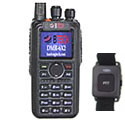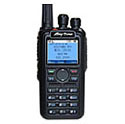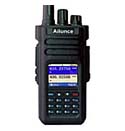Product Review
Zastone DP-880
aka Kirisun TP-660
DMR Handheld
TDMA Tier 2
VHF or UHF
Part 90 IP-67
July 2018

|
Zastone DP-880
The Zastone DP-880 was actually introduced in late 2014, so it's not a new comer to the DMR world. It recently showed up again on eBay and my curiosity got the best of me. Here's a breakdown of the radio, so let's take a look. In the Box Included with the radio are the: - Li-Ion Battery (7.2V 2500mAh) - Belt clip - 13 page "Instruction Manual" - Charger base - AC wall supply !2V 1A (Euro Connector) - AC adapter (Euro to US) - Antenna – 5.5" (14cm) - Lanyard General Description - UHF - Tier 2 DMR and Analog (WB and NB) - Size: 4.8 * 2.1 * 1.5" (122*54*37mm) - Weight: 11oz (320g) w/ant & 2400mAh battery - 400-470 MHz - CTCSS/DCS - 1.0w / 4.0w transmit - 1.5W audio amp - 1000 channels - 250 Zones (up to 128 channels per zone) - 250 contacts - Part 90 compliant - Q5ETP66002
Transmitter The frequency range of the DP-880 is UHF 400-470 MHz and supports both DMR and Analog (WB and NB). The power levels hold pretty close to the specifications with 1.1 on low power and 4.0W on high. There is no audio level adjustment, but holding the handheld about an inch away gives me solid audio reports. For the power levels listed below, I used a calibrated Bird Termaline wattmeter.
Receiver and Audio The receiver sensitivity and selectivity are excellent on both digital and analog. I found the receiver audio excellent with clear good sounding audio delivered with a 1.5W audio amp. Note: The one drawback is that when a station is received, there's an annoying popping sound at the beginning of the received signal. This also occurs if you have keypad tones selected. The popping sound occurs along with the tone. Enclosure The DP-880 has a case that you would expect from a commercial transceiver. It's solid and weighs in at 10.6oz (300g) with the battery and antenna attached. Battery removal requires a push of the release on the bottom of the case. A smooth easy push of the latch and the battery slides down. The belt clip attaches to the case, not the battery. Note: Although the radio is rated IP-67 (dustproof, waterproof), I found that when the battery was in place, it would still move up and down about 1/32" (.8mm). That's enough to let water into the battery compartment.
The radio has 3 programmable keys. Two on the side and one on the top.
I found the keypad buttons a bit narrower than most. The keypad format is three across and four down. This puts the zero (0) at the bottom of the keypad. The PTT button has an easy touch, so there's no cramped fingers during a long transmission.
Antenna The included UHF antenna measures 5.5" (14cm). The connector on the radio is an SMA-male, so a replacement antenna with an SMA-Female connector should fit easily.
Display could be better The LCD contrast leaves a bit to be desired. As shown below, the contrast is low. The display is very basic with one line showing the status icons and a second line displaying the 16 character channel information. When receiving, the top line displays the receiving stations DMR ID while the bottom shows the Talk Group. The is no area for a DMR ID database. I found there is no option to control the length of time that the display stays lit. It only lights up for 5 seconds when a keypad button is pressed. When a station is received, the display remains dark.
Software When I loaded the software for the DP-880, I recognized the format as being the same as the popular TYT MD-380. Although the code plugs are Not interchangeable, I was able to use the G6AMU Code Plug Editor to transfer the basic data into the DP880 CPS. (Contacts, Channels). This made the initial setup a bit easier. Although some of the data is transferable and the software is similar, this is not a TYT internally. The main boards are a totally different design. The software does not provide for storing of a DMR ID database. Firmware There may be software allowing the firmware to be updated, but at this time I have not been able to locate information or files to accomplish this. Programming Cable The DP-880 programming cable has the USB interface chip inside the radio. The cable itself is straight through, as there is no circuitry inside the cable itself. The driver (STMicroelectronics 3.0.4.0.) loads automatically when the cable is attached. The connector is design is very characteristic of radios with an IP-67 waterproof rating. The programming cable was not included with my radio and was an $18 extra expenditure.
Battery and Charger The included battery is 7.4V at 2500mAh. The charger base requires a 12vdc wall supply which is included. The AC adapter comes with a Euro wall receptacle, but a Euro to US adapter is included. The charger base has 3 separate LEDs on the front. - A green LED is lit at idle. - Inserting the radio switches to a red LED. - At the end of the charge cycle, a yellow LED appears. My best guess is that this is a maintenance or trickle charge. The battery easily charges to full capacity with an overnight charge.
Instruction Manual Do not confuse this with an owners manual or programming guide. This is a 13 page booklet that explains how to turn on the radio and turn up the volume. The last 4 pages are for your notes. There is not reference to features, programming or setup. Conclusion - Pros and Cons I found this radio lacking in many of the areas convenient to general operation. Posting this review is for information only and not a recommendation for purchasing. I found the pros to be: - Solid Construction - Tier II DMR - FCC Part 90 certified - 1.5W audio amp Concerns: - Loose battery - IP-67 questionable - No adjustable display timing - Low resolution display - Lack of information shown during operation - Popping noise when receiving and with keypad tones - No User Manual Note: The FCC Part 90 certification (2014) is registered to Kirisun Communications who is the actual manufacturer of this radio. Note: This equipment was purchased by me. This is an unbiased review. All findings are factual based my personal experience.
|
TOP of PAGE
Miklor Home
Miklor Home
BTECH  DMR6X2 PRO Dual Band (Review) Anytone  D878UV II+ Dual Band (Review)  D578UV Series Mobiles Hotspot  SkyBridge MAX (Review) Ailunce  HD1 / GPS (Review) Amplifiers  BTECH DMR Amps UHF VHF (Review) Repeaters  Ham / GMRS Commercial Repeaters Duplexers |














